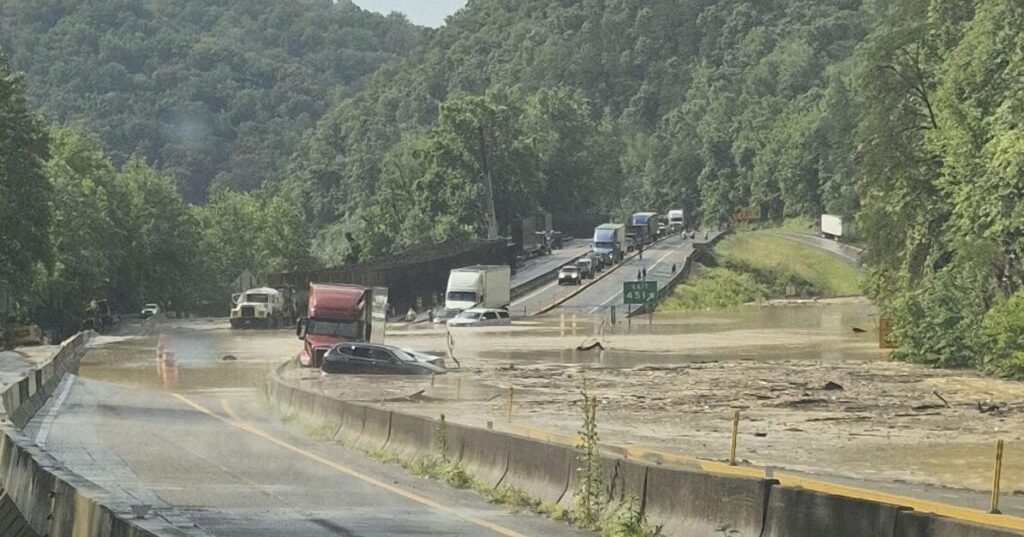Interstate 40 Closure: Heavy Rain and Rock Slide Disrupt Travel in the Smoky Mountains
The majesty of the Smoky Mountains has once again collided with Mother Nature’s unpredictable power. As someone who’s spent years exploring and writing about these ancient hills, I’ve witnessed firsthand how quickly these serene landscapes can transform during severe weather events.
This week, a section of Interstate 40—one of America’s crucial cross-country highways—has been closed due to a perfect storm of heavy rainfall, flooding, and a substantial rock slide. The closure affects the narrow corridor that winds through the Tennessee mountains near Hartford, creating significant disruptions for both locals and travelers.
Understanding the Impact of I-40’s Closure
For those unfamiliar with the area, I-40 serves as a vital east-west artery connecting North Carolina and Tennessee through the Smoky Mountains. This particular stretch near Hartford, Tennessee, has a history of vulnerability to natural events, primarily due to its position cutting through steep mountain terrain alongside the Pigeon River.
When these closures happen, they don’t just inconvenience travelers—they can significantly impact local economies, emergency services, and supply chains. Communities along this corridor often feel isolated when their primary connection to larger cities is severed.
The Geology Behind Mountain Rock Slides
Having witnessed several rock slides in the Smokies over the years, I can tell you these aren’t simple events. The Appalachian Mountains, of which the Smokies are part, contain layered sedimentary rock formations that can become unstable when saturated with water.
During heavy rainfall, water infiltrates the cracks and crevices in the mountainside. This added weight, combined with the lubricating effect of water, can cause entire sections of a slope to give way. The resulting debris—sometimes thousands of tons of rock and soil—comes crashing down onto roadways below.
Historical Context: Not the First Closure
This section of I-40 has a complicated relationship with nature. In October 2009, a massive rock slide near the Tennessee-North Carolina border closed the interstate for six months, requiring extensive engineering work to stabilize the mountainside.
More recently, in 2019, another significant closure occurred due to similar circumstances. Each time, the Tennessee Department of Transportation (TDOT) and North Carolina Department of Transportation (NCDOT) have worked to not just clear the debris but implement measures to prevent future slides—though Mother Nature often has other plans.
Alternative Routes and Travel Impacts
For travelers and truckers, these closures mean significant detours. The most common alternative routes include:
- I-26 to I-81 through Johnson City and Bristol
- US-25/70 through Hot Springs (though this narrow mountain road isn’t suitable for large vehicles)
- I-75 to I-640 around Knoxville (for those traveling between western Tennessee and North Carolina)
These detours can add hours to travel time and place additional strain on secondary roads not designed for interstate-level traffic volumes.
The Broader Environmental Picture
As someone who’s deeply connected to the Smoky Mountains, I’ve observed changing weather patterns over the years. Meteorologists and climate scientists have noted that the Southern Appalachian region has seen an increase in extreme precipitation events—the kind that trigger these rock slides and flooding incidents.
The steep slopes of the mountains, combined with thin soils and the region’s abundant rainfall, create naturally hazardous conditions. When we experience particularly intense rain events, as appears to be the case with this closure, these natural vulnerabilities are amplified.
What This Means for Local Communities
The communities near Hartford, Tennessee, and neighboring areas like Hot Springs, North Carolina, often bear the brunt of these closures. Tourism can decline, while local residents may face challenges accessing medical care, groceries, and other essentials.
However, I’ve always been impressed by the resilience of mountain communities. Neighbors help neighbors, and the strong sense of community spirit helps these small towns weather the isolation that can come with major road closures.
Looking Forward: Recovery and Reopening
Based on previous incidents, the timeline for reopening depends entirely on the severity of the rock slide and associated damage. TDOT crews typically work around the clock in these situations, but ensuring safety is their primary concern.
Engineering solutions might include:
- Scaling operations to remove loose material from the slope
- Installation of rock bolts or mesh systems to stabilize remaining sections
- Rebuilding damaged roadway sections
- Improving drainage systems to better manage future heavy rainfall
Travelers planning to pass through the area should monitor TDOT’s website and social media channels for the most up-to-date information on closures and estimated reopening times.
The Silver Lining for Travelers
While detours are inconvenient, they often take travelers through some of the most scenic and less-visited parts of the Appalachian Mountains. If you find yourself rerouted, consider it an opportunity to explore charming mountain towns, discover local eateries, and experience the region’s famous hospitality.
As someone who has spent countless hours exploring these mountains, I can assure you that sometimes the unplanned detours lead to the most memorable experiences.
Stay Informed and Travel Safely
If you’re planning travel through this region in the coming days or weeks, I strongly recommend:
- Checking TDOT’s SmartWay traffic information system before departing
- Having physical maps as backup (mountain areas can have spotty cell service)
- Keeping extra supplies in your vehicle, including water and snacks
- Building extra time into your travel plans to accommodate detours
- Considering delaying non-essential travel through the affected corridor
The Smoky Mountains have stood for millions of years, weathering far more than our highways and infrastructure. This closure is a reminder of nature’s power and the respect it demands from those of us who live in or travel through these ancient hills.

